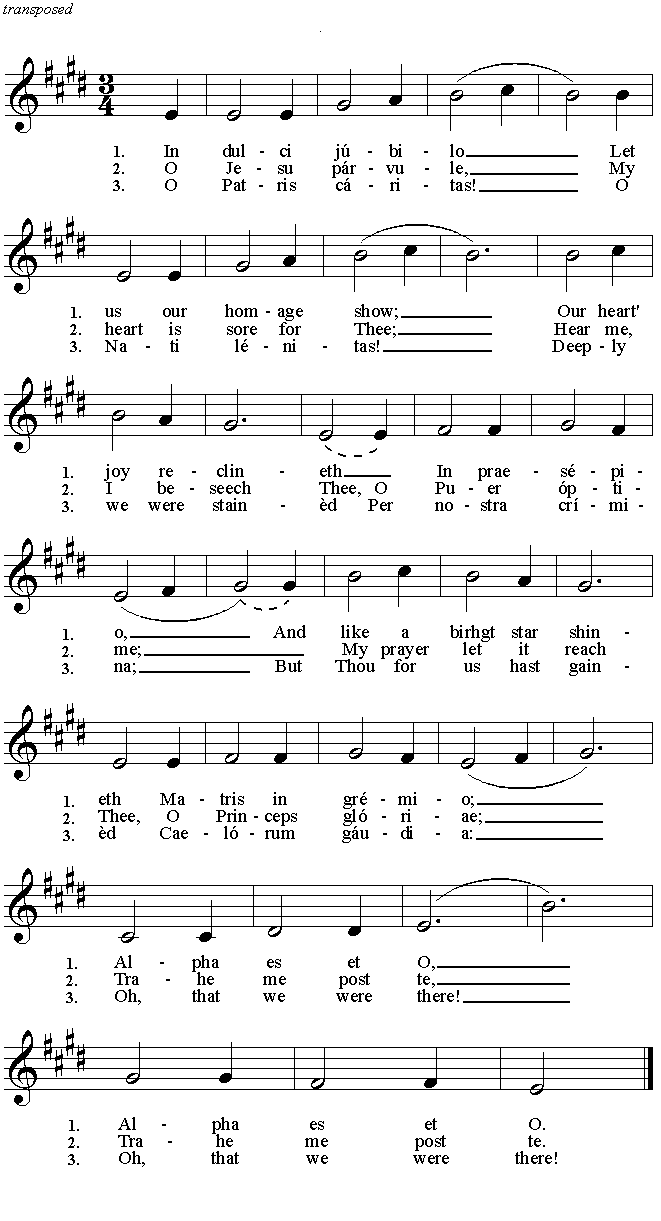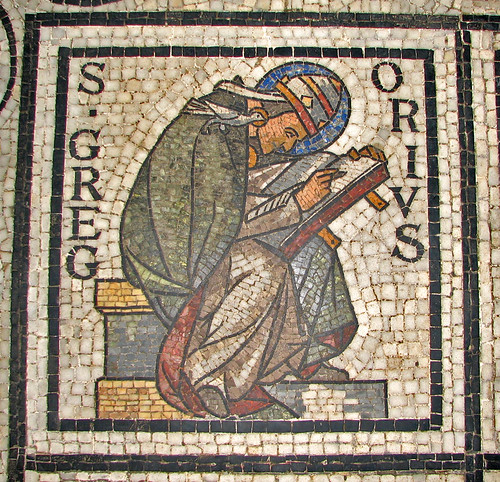2010-10-06
Ten Cheers for Tyndale
Let us render hearty thanks to God for these two servants. And let us take up their cause by reading the Scriptures for ourselves in "a language understanded of the people" and applying it to our lives.
COLLECT: Almighty God, you planted in the heart of your servants William Tyndale and Miles Coverdale a consuming passion to bring the Scriptures to people in their native tongue, and endowed them with the gift of powerful and graceful expression and with strength to persevere against all obstacles: Reveal to us your saving Word, as we read and study the Scriptures, and hear them calling us to repentance and life; through Jesus Christ our Lord, who lives and reigns with you and the Holy Spirit, one God, for ever and ever. Amen.
Below is an excellent video that gives an accessible visual rendering of the history of the English Bible.
2010-02-15
President's Day Tridentine Style
2009-12-23
In Dulci Jubilo

This has to be one of my favorites - the intermingling of the Latin and vernacular texts is so perfectly Anglo Saxon.
2009-10-28
Jubilate Deo!
Somehow I just cannot get enough of these boys' singing! The luscious scenery ain't hurting, either!
2009-08-11
A Mother Load!
 Okay...I've not been blogging much. It's because I've been slogging through tons of flood backup in my basement.
Okay...I've not been blogging much. It's because I've been slogging through tons of flood backup in my basement.The good Lord promised never to destroy the whole earth by floods again, but he said nothing about my computers and 20+ book cases. So imagine my delight when I found that my library - while physically diminished - is growing thanks to Google Books. The University of Birmingham has a fantastic bibliography of neo-Latin texts, including plenty of solid gold from the Reformation.
Almost makes you want to run out and sign up for the Cambridge or Oxford Latin course, huh?
2009-03-12
More Gregorian than gregarious
 Some people think that I'm not "nice" because I hold vowed officers of the church to the faith handed down by the apostles. Well, on this March 12, commemoration of Gregory the Great, Doctor of the Church and Bishop of Rome, I'm going to try to be more gregarious. . . or at least Gregorian.
Some people think that I'm not "nice" because I hold vowed officers of the church to the faith handed down by the apostles. Well, on this March 12, commemoration of Gregory the Great, Doctor of the Church and Bishop of Rome, I'm going to try to be more gregarious. . . or at least Gregorian.Here's a little info on the sainted bishop.
Gregory was born around 540, of a politically influential family, and in 573 he became Prefect of Rome; but shortly afterwards he resigned his office and began to live as a monk. In 579 he was made apocrisiarius (representative of the Pope to the Patriarch of Constantinople). Shortly after his return home, the Pope died of the plague, and in 590 Gregory was elected Pope.
Like Leo before him, he became practical governor of central Italy, because the job needed to be done and there was no one else to do it. When the Lombards invaded, he organized the defense of Rome against them, and the eventual signing of a treaty with them. When there was a shortage of food, he organized the importation and distribution of grain from Sicily.
 His influence on the forms of public worship throughout Western Europe was enormous. He founded a school for the training of church musicians, and Gregorian chant (plainchant) is named for him. The schedule of Scripture readings for the various Sundays of the year, and the accompanying prayers (many of them written by him - and still sung!), in use throughout most of Western Christendom for the next thirteen centuries, is largely due to his passion for organization. His treatise, On Pastoral Care, while not a work of creative imagination, shows a dedication to duty, and an understanding of what is required of a minister in charge of a Christian congregation.
His influence on the forms of public worship throughout Western Europe was enormous. He founded a school for the training of church musicians, and Gregorian chant (plainchant) is named for him. The schedule of Scripture readings for the various Sundays of the year, and the accompanying prayers (many of them written by him - and still sung!), in use throughout most of Western Christendom for the next thirteen centuries, is largely due to his passion for organization. His treatise, On Pastoral Care, while not a work of creative imagination, shows a dedication to duty, and an understanding of what is required of a minister in charge of a Christian congregation.
Doctrinally speaking, there is little of great interest. He is known to have defended the physical resurrection from a subtle attack by no less than the Patriarch of Constantinople himself! Eutychius speculated on our resurrection bodies being "more subtle than air" but there is a record of his having recanted before death. (Hey...maybe I'm gregorious in dealing with my own Eutychius after all! With him, I say Pro cuius amore in eius eloquio nec mihi parco - "For the love of whom (God) I do not spare myself from his Word.") Gregory's letters and sermons are still readable today, and it is not without reason that he is accounted (along with Ambrose, Jerome, and Augustine of Hippo) as one of the Four Latin Doctors (=Teachers) of the ancient Church. (Athanasius, Gregory of Nazianzen, Basil the Great, and John Chrysostom are the Four Greek Doctors.)

English-speaking Christians will remember Gregory for sending a party of missionaries headed by Augustine of Canterbury (not to be confused with the more famous Augustine of Hippo) to preach the Gospel to the pagan Anglo-Saxon tribes that had invaded England and largely conquered or displaced the Celtic Christians previously living there. He was moved when he saw some fair-haired, blue-eyed Angle boys being sold in a slave market and quipped: "Non Angli, sed Angeli!" (they are not Angles, but Angels!) Gregory had originally hoped to go to England as a missionary himself, but was pressed into service elsewhere, first as apocrisiarius and then as bishop of Rome. He accordingly sent others, but took an active interest in their work, writing numerous letters both to Augustine and his monks and to their English converts.

I here mention something that was not Gregory's doing, but is an important part of Church history. It was in Gregory's lifetime that Rome, and with it the Western Empire, with astonishing suddenness, and for no reason that I know of, went monolingual. For more than six centuries previously, Greek had been spoken at Rome along with Latin. Every Roman with pretensions to being educated could speak it. Everyone involved in shipping and commerce, from banker to stevedore, could speak it. The list of the early Bishops of Rome has a fair proportion of Greek names. When Paul wrote an epistle to the Romans, he wrote in Greek as a matter of course. But in Gregory's lifetime this changed. Gregory was ambassador to the Eastern Patriarch at Constantinople for six years, but he never bothered to learn Greek. And in his day (not, as far as I have any reason to believe, as a result of his example or influence) most other Latin-speakers did not trouble to learn Greek either. The already existing difficulties of communication between Latin and Greek theologians were greatly exacerbated by this development. Increasingly, Latins did not read the commentaries and other writings of Greek Christians, and vice versa. Thus differences between the two that dialogue might have resolved were left to accumulate, culminating in the formal split between Latin and Greek Christendom in 1054.
If I were to select a ground on which this devout Christian of great accomplishments might reasonably be censured, it would be that his Dialogues, a book on the Lives of the Saints, is full of accounts of dreams and visions that various persons were said to have had of souls in Purgatory. Gregory, a man of keen critical judgment on many matters, was completely uncritical in his acceptance of these stories. A general belief in Purgatory was standard among Christians when he wrote; but his reliance on "ghost stories" to fill in the imaginative details gave the doctrine as held thereafter in Latin Christendom both a prominence and a coloring that it had not previously had, with results that many Christians, including adherents of the Pope, have found regrettable - and a constant impediment to church union.
PRAYER (traditional language):
Almighty and merciful God, who didst raise up Gregory of Rome to Be a servant of the servants of God, and didst inspire him to send missionaries to preach the Gospel to the English people: Preserve in thy Church the catholic and apostolic faith they taught, that thy people, being fruitful in every good work, may receive the crown of glory that fadeth not away; through Jesus Christ our Lord, who liveth and reigneth with thee and the Holy Spirit, one God, for ever and ever.
PRAYER (contemporary language):
Almighty and merciful God, who raised up Gregory of Rome to Be a servant of the servants of God, and inspired him to send missionaries to preach the Gospel to the English people: Preserve in your Church the catholic and apostolic faith they taught, that your people, being fruitful in every good work, may receive the crown of glory that never fades away; through Jesus Christ our Lord, who lives and reigns with you and the Holy Spirit, one God, for ever and ever.
2008-02-28
Only Six Quirky Things?
Okay...enough self-justification. Past the arms and through the fingers, careful gang...the scent will linger:
1) I have an unhealthy knowledge of academic dress. I know enough about proper academic decorum and decoration to put most marshals and provosts this side of the Atlantic to shame. I actually collect certain varieties of gowns and hoods. I belong to list-servs dedicated to the subject (and to academic culture in general - such as post-nominals, historical universities, etc.).
2) I have a similar fascination with ecclesiastical vesture. Now these are actually quite interrelated as, historically, the clergy was the educated class. Most academic regalia is patterned on monastic habits. Similarly, in the English speaking world, Protestant churches are where you're most likely to encounter academic garb outside of the university setting. I also wrote an FAQ on vesture for the PCUSA while I was an intern for the Office of Theology and Worship. As my buddy Dave said, it's a subject in which I have a vested interest. (nyuk nyuk nyuk)
3) I'm fascinated with zombies. I like reading about them, watching movies about them, thinking about my plans for our family's survival in a post-apocalyptic zombie-infested America. It's really weird. We're looking at buying a house now, and my wife is already starting to anticipate my “that's not really zombie-proof” quip when the realtor points out all the natural lighting from a bay window.
4) I learned to cook from TV. It all started with Mr. Rogers making snacks in the kitchen. Then, I advanced to the The Frugal Gourmet. I remember back when the TV Food Network was only broadcast on for a few hours each day. Then they expanded the airtime by simply repeating the shows! How to Boil Water gave a great overview of the basics, and Mario Batali (whom I dressed as for Halloween one year when my hair was still long) taught me simple Italian cuisine. I still enjoy cooking shows, but my work schedule keeps me out of the kitchen.
5) I have trouble going straight through a book. I don't know what it is, but I can't seem to make my way through a single book without picking up two or three to work in on the side. I think part of it is this nasty compulsion I have with checking references. I refuse to leave a footnote unread; sometimes, I even go and check the reference myself. I'll even scan the end notes for a chapter and mentally tick which ones need to be read when I encounter them just to save time (after all, there's no sense flipping pages just to read an ibid. or idem). This isn't just for academic reading. I do this all the time. It drives Mrs. GrknDeacon nuts. About the only text I don't do this with is the Good Book, but then I trust its author implicitly.
6) I can't let a bad pun lay undone. I'm incorrigible when it comes to this. If I hold it in, my internal organs start to liquify or something. Anyone who has been around me for more than 10 minutes will start to groan and wince as I do this about that often. I have to seriously work at keeping them out of sermons, lectures, etc. It's a bit of a pride thing, as it's easy to get caught up in my own cleverness. But occasionally, I'm also able to make somebody smile. (Dave, thank you for good-naturedly groaning at them.)
I'm not tagging this to anyone because, outside of the consistory, I have no idea who reads me regularly. But if you do read this, and you decide to take it up, please link to it in the comments section.
2007-12-18
Become a Latin Lover
 But if it's all my brothers and sisters, plus my parents, a hortatory subjunctive like abeâtis might be in order?"
But if it's all my brothers and sisters, plus my parents, a hortatory subjunctive like abeâtis might be in order?"No snickering about the name of the author: Harry Mount.
2007-09-14
Just Kitting
If you are looking for quality hand-made vestments, let me suggest Work of Her Hands. The proprietess is a whiz with the needle and cloth, and one heavenly mother!






